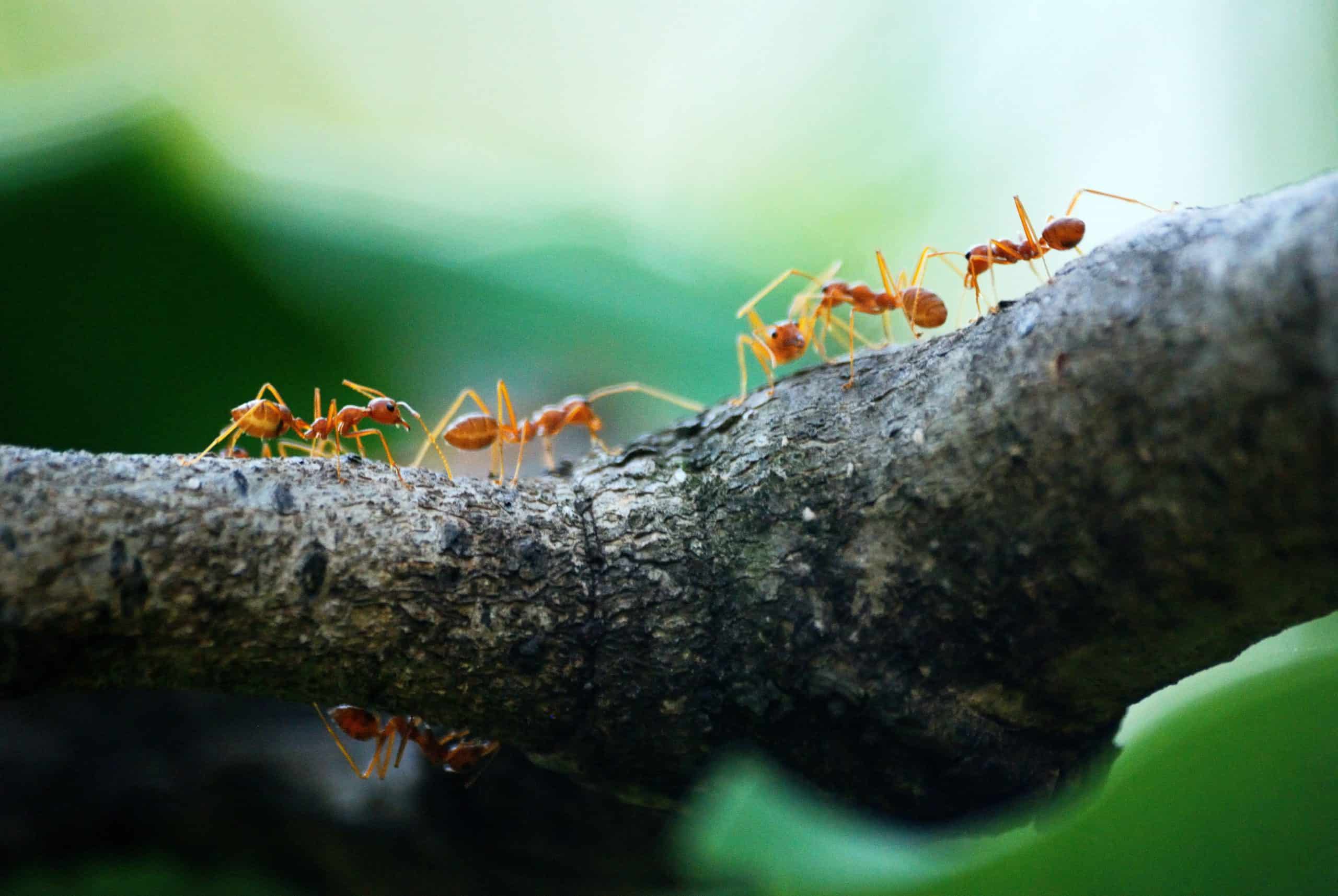Types of Ants in Missouri:
At one time or another, we’ve all seen these tiny insects marching across our floors or foraging on our counters. These insects are common invaders of homes and are a real nuisance for homeowners in St. Charles, St. Louis and throughout Missouri. While there are several hundred ant species occurring throughout the United States there are only a small group of ants that tend to invade Missouri homes. Let’s take a closer look at some of the more notorious house infesting ants.
Pharaoh Ants
These dumpster divers are the ants most likely to spread disease pathogens in hospitals and other healthcare facilities. Pharaoh ants are a common insect that find their way into Missouri homes. Here are some common characteristics to help you identify them.
- They are yellowish to orange in color
- Are approximately 1/16 inch long in length.
- The diet of pharaoh ants consists of foods containing fats, proteins and sweets and they will forage for these items both in their natural surrounding outdoors and inside a home.
- When pharaoh ants nest indoors they seek out conditions that are warm or humid and that are in close proximity to food and water. Accessible areas such as wall voids, behind baseboards, under floors and even in furniture are all ideal locations for invading pharaoh ants.
Odorous House Ants
These ants are going to make quite a stink if you step on them, and often, you can't help but step on them. Here is how you can identify odorous house ants in your home.
- The odorous house ant is native to our state and is often considered the most common home invading species of ants.
- It measures about 1/8 inch long
- It is dark brown to black in color
- The odorous house ant is most often recognized by the coconut-like odor it emits when crushed.
- They feed on honey dew and plant nectar found outdoors, however, these irritating pests will invade homes in large numbers to find food when their usual supply runs low.
- Indoors odorous house ants can be found constructing nests in wall voids, especially around hot water pipes and heaters, in crevices around sinks and cupboards as well as behind siding and stucco.
Pavement Ants
For this type of invasive ant, its name speaks for itself. These ants build colonies under pavement, in sidewalks, and under concrete slabs. This often brings them into homes through basement walls. First introduced by early European colonists, pavement ants have since become a regular invader of residential dwellings.
- Pavement ant workers are generally about 1/8 inch long
- They range in color from brown to black.
- To an untrained eye it may be hard to see, but, pavements ants feature parallel furrows and ridges on their head and thorax.
- Their palate is not exactly refined, as they will eat just about anything including other insects, honeydew, seeds and people food. They do prefer meat and grease when they have the option.
- Their nests are commonly located in or under cracks in pavements as well as in soil beside driveways and sidewalks.
- Inside, however, pavement ants are likely to be found nesting in walls, in insulation and under floors and in the wintertime areas that are near a heat source appeal to these ants.
Other Types of Invasive Ants
- Small Honey Ants– Small honey ants are the most tolerant of colder weather, meaning they can be seen year round digging into your snacks.
- Acrobat Ants– These ants get their name from the fact that they can hold their abdomen up over their head in sort of a balancing act. These ants can be found invading homes all across the United States, including Missouri.
- Field Ants– These ants don't always wait in fields and meadows. These ants can get into man-made structures in their search for food.
- Carpenter Ants– Of all the ants that can invade your home or business, this ant is the most destructive. Carpenter ants will tunnel through the wood in your home in order to create a home for themselves. The damage can have significant impact on the structural integrity of your home if left untreated.
Why is Getting Rid of Ants So Difficult?
Your immediate question is, what makes ant control so difficult? One of the reasons to call our pest control company is that the task of extermination is too difficult for any homeowner to do it alone, as ants live in large colonies that can number in the tens or even hundreds of thousands. The heavy volume of ants makes it a challenge to reach total extermination on your own. Also, these huge colonies build in the most unusual of places. Ants can build their colonies behind the cabinetry in your kitchen or even under the pavement in front of your home. Lastly, selective killing with pesticides used by the homeowner is almost futile, as this will only scatter the ants and won't destroying the colony. Every ant must be destroyed or the colony will quickly repopulate itself and continue its invasion of your home.
Prevent Ants From Invading Your Home
If you are already witnessing foraging ants in the kitchen, bathroom or elsewhere in your dwelling, then you should consider contacting a pest control company to help you get rid of ants. If you are not already dealing with ant problems and are simply looking for ways to prevent pavement ants, carpenter ants and other ants in St. Louis from invading your home, try these ant prevention tips from Rottler Pest Solutions.
Inside Your Home
- Clean up food (including pet food) and beverage spills as soon as they occur
- Keep food preparation areas and floors clear of crumbs
- Regularly clean under and around appliances to remove grease, food debris and other items that attract ants
- Store food in airtight containers, glass or durable plastic if possible
- Organize pantry items so that you use oldest items first
- Be diligent in taking out trash
- Eliminate moisture and you can reduce the ant population within your home. Ants need moist environments to survive and if you have a very humid home, or there is dampness near sinks you may find ants happily roaming around.
Outside Your Home
- Seal openings around doors, windows and the foundation
- Store firewood well away from buildings and up off the ground
- Make sure your trash cans have tight-fitting lids and are free of holes
- Eliminate hiding spots. Cut back vegetation, tree branches and move wood piles or other debris from directly around the exterior of your home.
How to Avoid Ants Outside
- Get elevated. If you're looking to have a classic picnic with some type of spread on the ground, then this tip isn't for you. But, if your plan is just to add a cookout to your outdoor activities, it is best to eat your food elevated. That will make it harder for ants to zero in on open beverages, and food sitting on plates.
- For added protection, you can bring some tin pie plates with you and put them under the legs of your picnic table, fill those plates with water, and create a barrier that will keep ants from climbing up.
- Keep your trash elevated or in a sealed container, to avoid attracting ants to your location. Or, if you prefer, keep the trash away from where you are having your picnic.
- If you're having your picnic on a blanket, it is a good idea to keep food in sealed containers when you are not preparing a plate of food to eat.
- If you are not elevated, it is a good idea to keep all sweet beverages in sealed containers.
- Mosquito repellent sprayed on your legs can help to prevent unwanted ants, especially fire ants. A repellent with oil of lemon eucalyptus is a nice, natural option.
- Before you return home, check your bag to make sure you don't have any stowaways.
Contact a Local Pest Control Company For Help
If you're finding ants on your property, the specialists here at Rottler are educated in the eradication and control of these and other pests. Get your home plugged into our Singature Pest Protection and you'll have complete protection from a wide range of bug and animal pests that can spread illness in your home, and damage your property, including ants. Don't go another day unprotected from these pests, call, text or chat with Rottler today and be free from them, once and for all!


